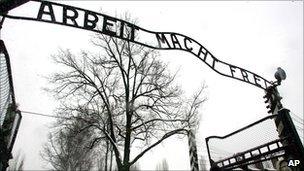Three plead guilty to Auschwitz sign theft
- Published

The sign's theft caused outraged in Poland, Israel and elsewhere
Three men have pleaded guilty to the theft of the infamous "Arbeit Macht Frei" sign from the Auschwitz death camp, Polish prosecutors have said.
Under a plea bargain, the men - two Poles and a Swede - accepted prison terms of between 28 and 32 months.
The sign was recovered cut into three pieces three days after its theft in December last year.
Of the six million people, mostly Jews, murdered in the Nazi Holocaust, one million were killed at Auschwitz.
It is now up to the Polish court to decide whether to accept the deal and sentence the men without trial, an outcome considered likely.
Second Swede?
The Swedish man, Anders Hoegstroem, is known to have neo-Nazi ties.
A spokesman for the prosecutors' office in Krakow said Mr Hoegstroem had admitted his role in the theft.
"After having pleaded not guilty during the investigation, Hoegstroem admitted his guilt," prosecutor Robert Parys told AFP news agency.
"Under a plea bargain with prosecutors, he accepted a penalty of two years and eight months in prison. He will serve his sentence in Sweden."
He was initially thought to be the mastermind of the theft, but Mr Parys said a second Swede, so far unidentified, was behind the offence.
"In our investigation we have uncovered evidence indicating the possibility that a Swedish citizen on Sweden's territory might have instigated another Swedish citizen to commit a crime connected with the theft of the Arbeit Macht Frei sign," Mr Parys was quoted as saying by Reuters news agency.
The two Poles, identified as Marcin A and Andrzej S, accepted prison terms of 30 months and 28 months respectively.
Three other Poles were convicted earlier this year for stealing the sign and are serving sentences ranging from 18-30 months.
The theft of the 5m (16ft) wrought-iron sign, which stood above the entrance to the death camp, caused outrage in Poland, Israel and elsewhere.
The slogan, which translates as "Work sets you free", symbolises for many the atrocities of Nazi Germany.